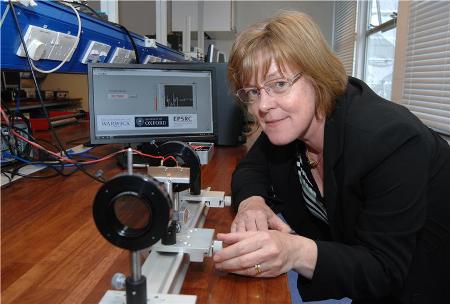Scientists at the Oxford University and University of Warwick have developed an optical temperature sensor using a ‘birefringent’ crystal that separates light transmitting through it into two individual rays.
The crystal named Zero-Birefringence Optical Temperature Sensor (Z-BotS), can measure temperature over a wide range between −120°C to +680°C at milli-kelvin accuracy. According to the study, the scale of the birefringence effect will decrease or increase proportionately with the crystal’s temperature. Hence, theoretically, these crystals can be used as precise temperature gauges but practically, several challenges need to be addressed to ensure they are used effectively.
 University of Warwick's Professor Pam Thomas with the device a Zero-Birefringence Optical Temperature Sensor
University of Warwick's Professor Pam Thomas with the device a Zero-Birefringence Optical Temperature Sensor
The birefringent crystal’s orientation and thickness affect its temperature measuring capability. This makes the production and calibration processes of such crystals very expensive as well as makes the crystals unusable in certain conditions such as vibration, which could change the crystal’s orientation.
To address these issues, the Oxford and Warwick scientists have devised a cost-effective and reproducible process of altering the qualities of crystalline lithium tantalite in order to make its birefringence almost independent of its position and thickness, which in turn makes the crystal resistant to vibration and inexpensive to produce. The birefringence has also been made virtually zero in size in all directions.
However, even a mild change in temperature stimulates a quick rise in birefringence in these crystals, enabling this technique to be a highly sensitive and reliable one for temperature measurement. At present, the researchers are looking for follow-on financing to develop the bench-top proof-of-concept into a small commercially-available device.
The University of Warwick’s Professor Pam Thomas stated that this innovation, a result of the EPSRC-funded research, enables the researchers to develop a new-generation birefringent crystal-based temperature sensing device, which will be ideal for high voltage, radio frequency and electromagnetic environments where other sensors may provide erratic results due to interference. Temperature measurement in the human body, industrial microwave dryers and MRI scanners are some of the few examples, she added.